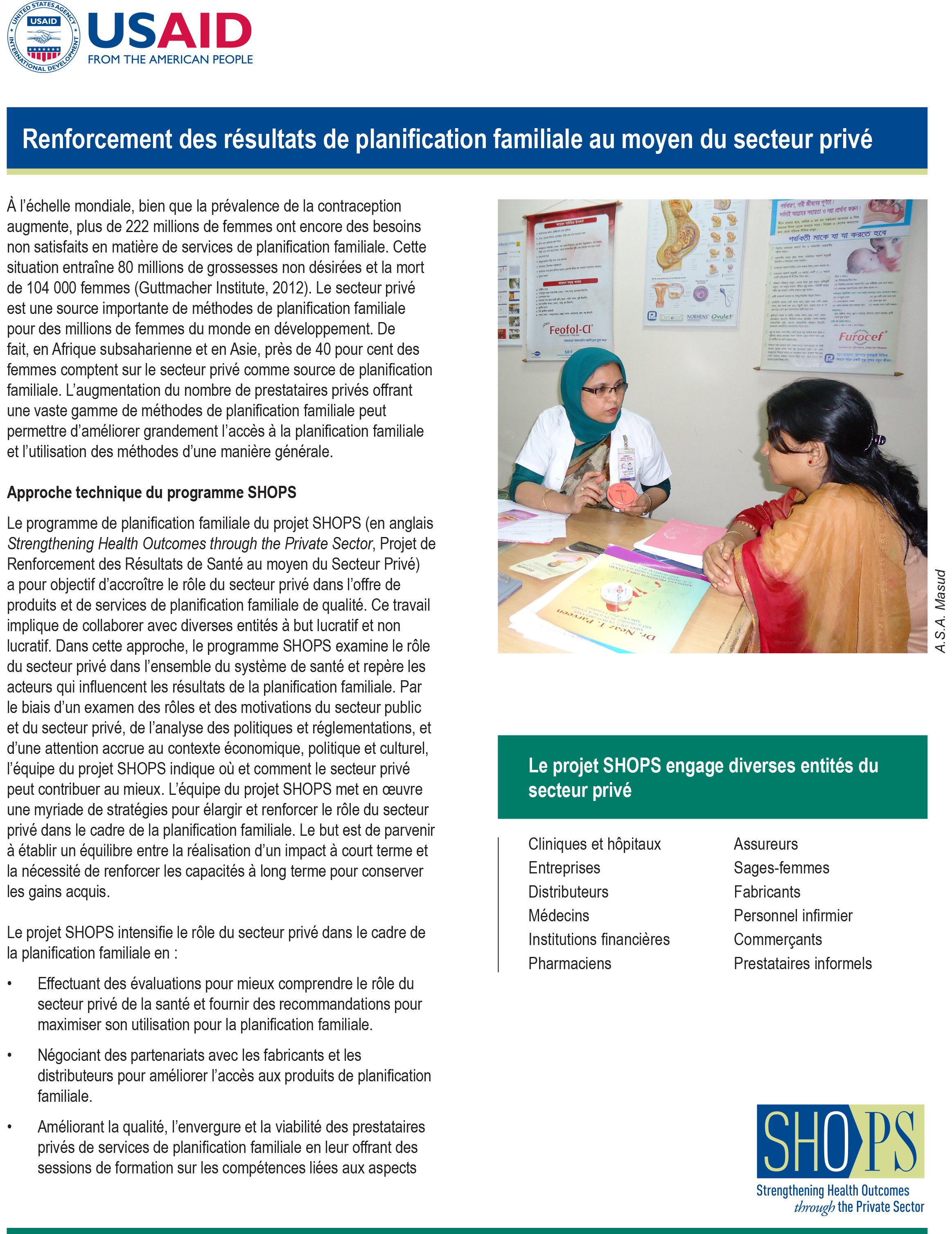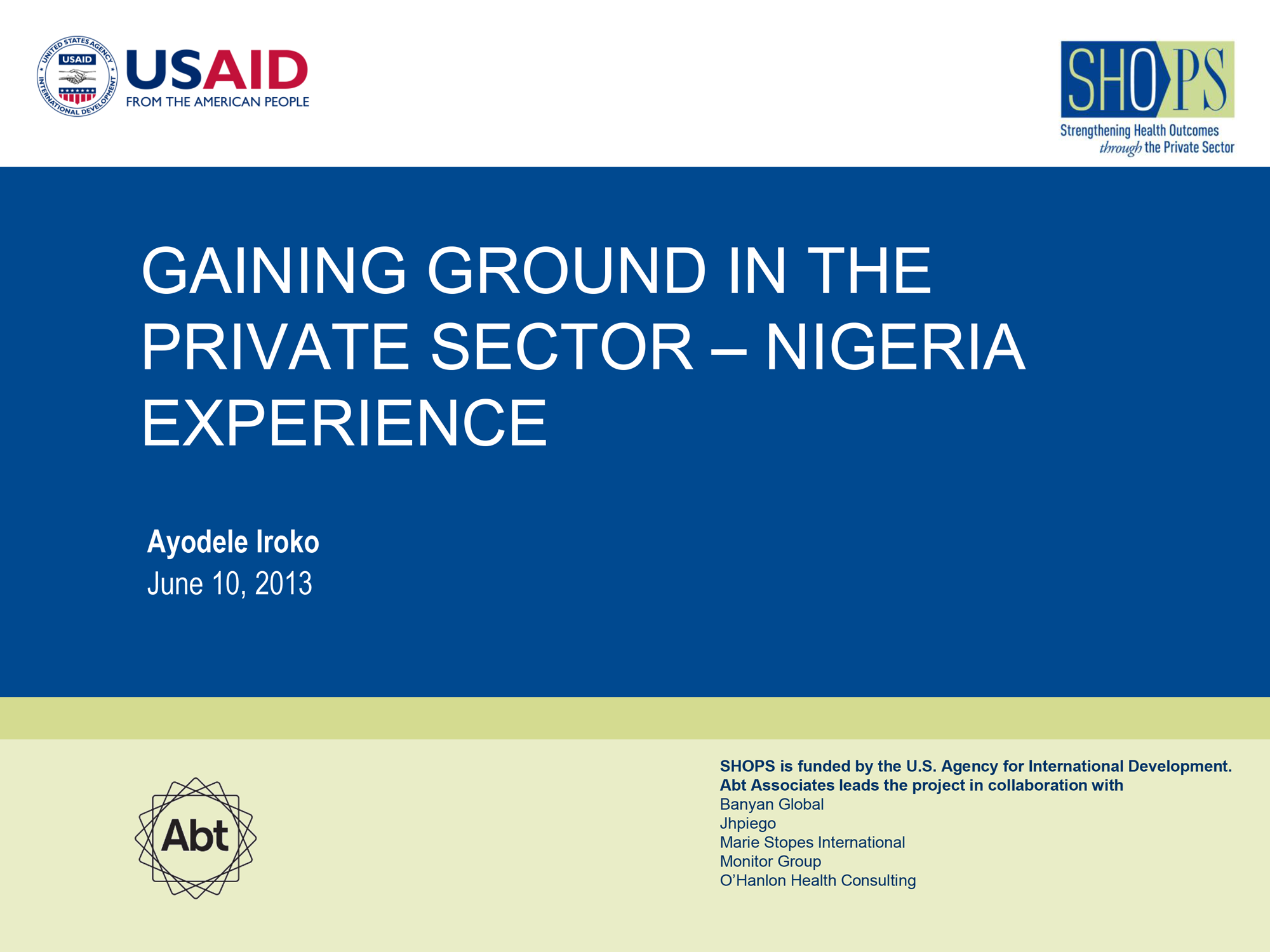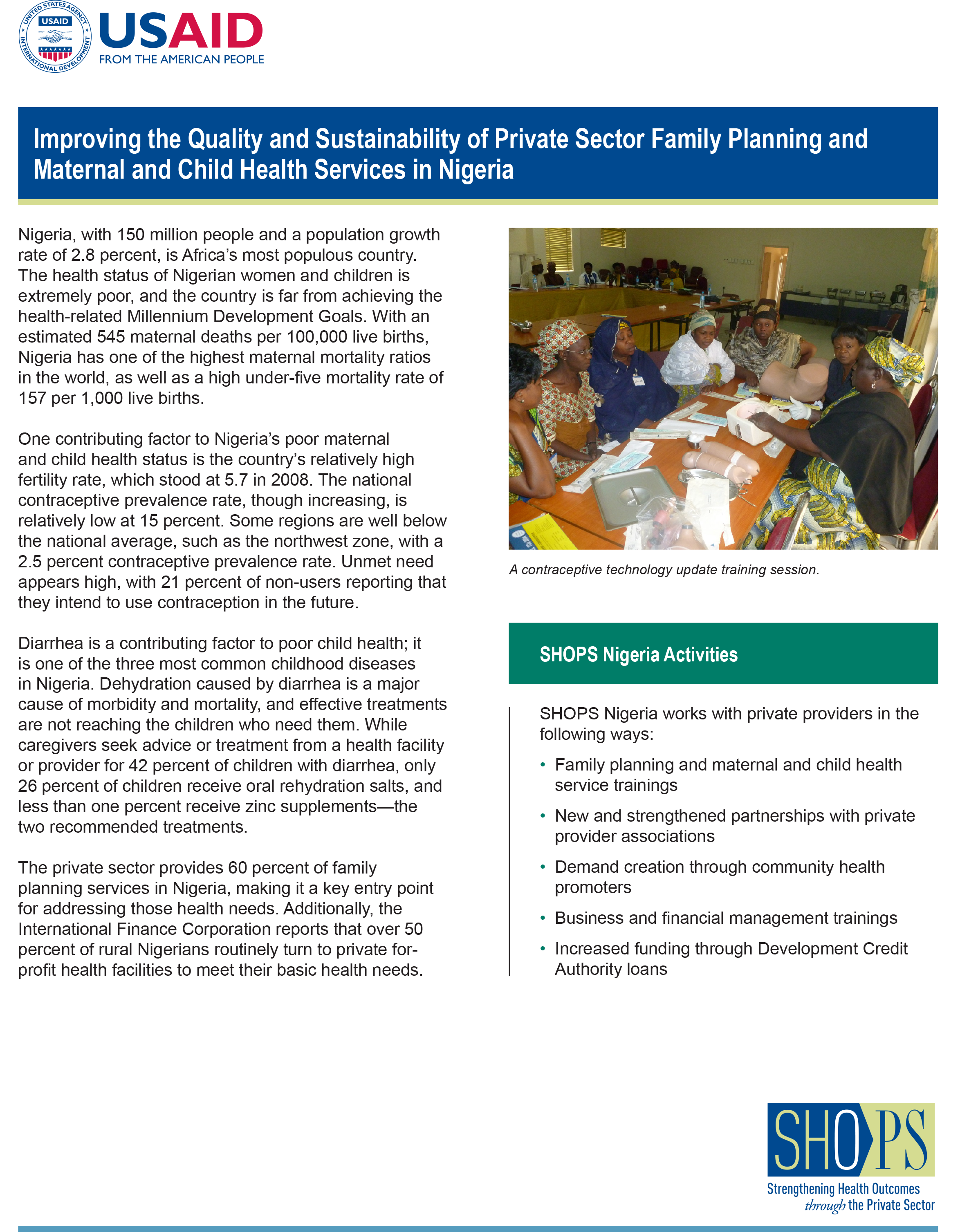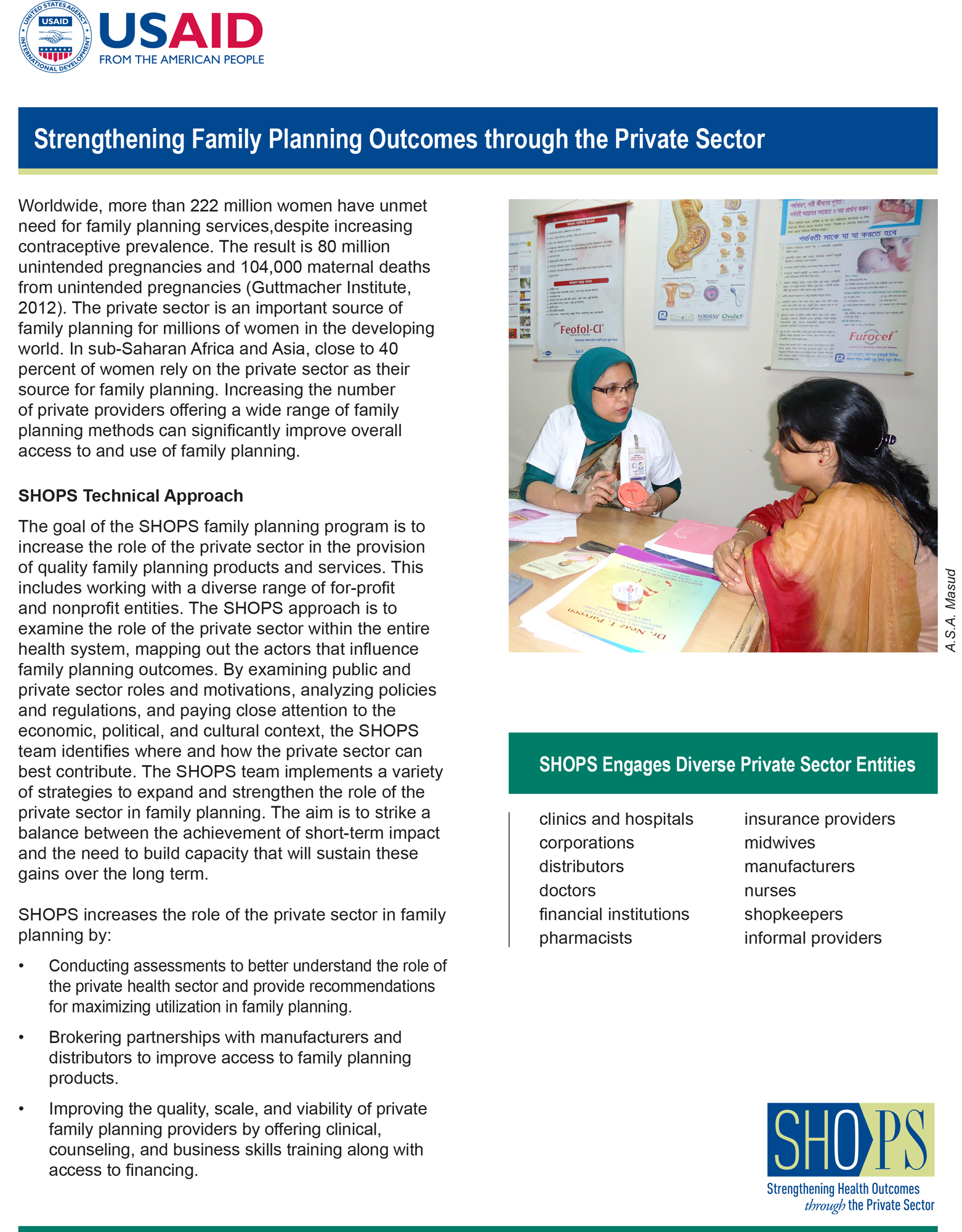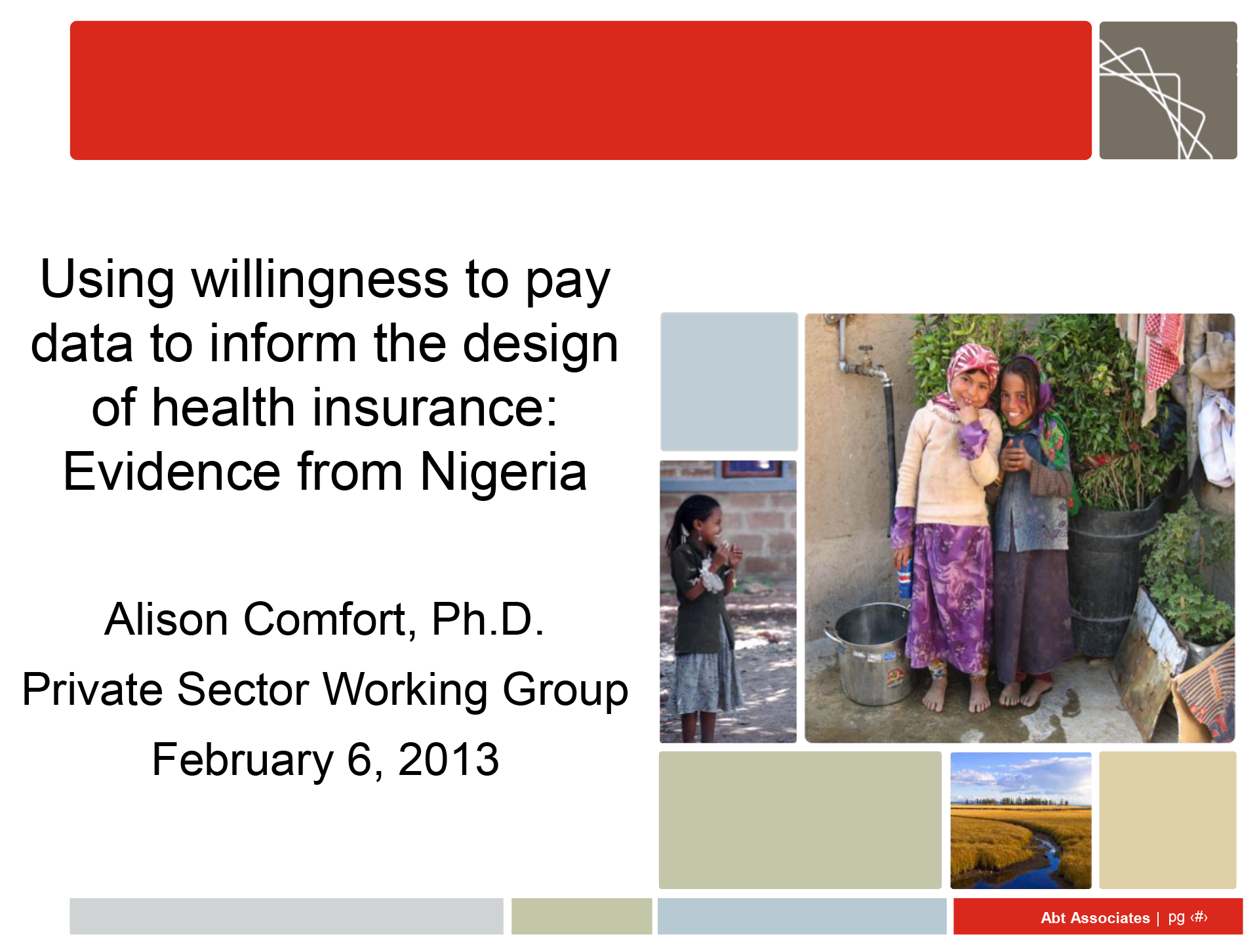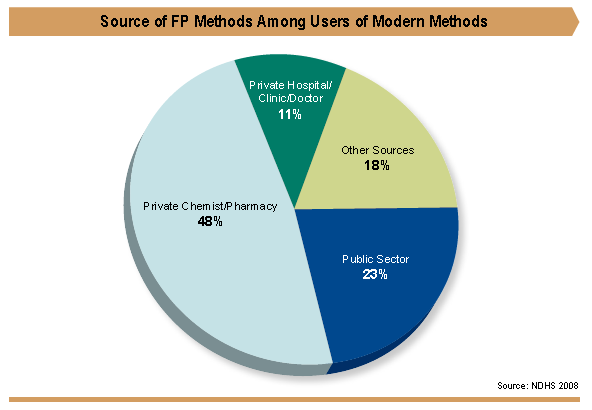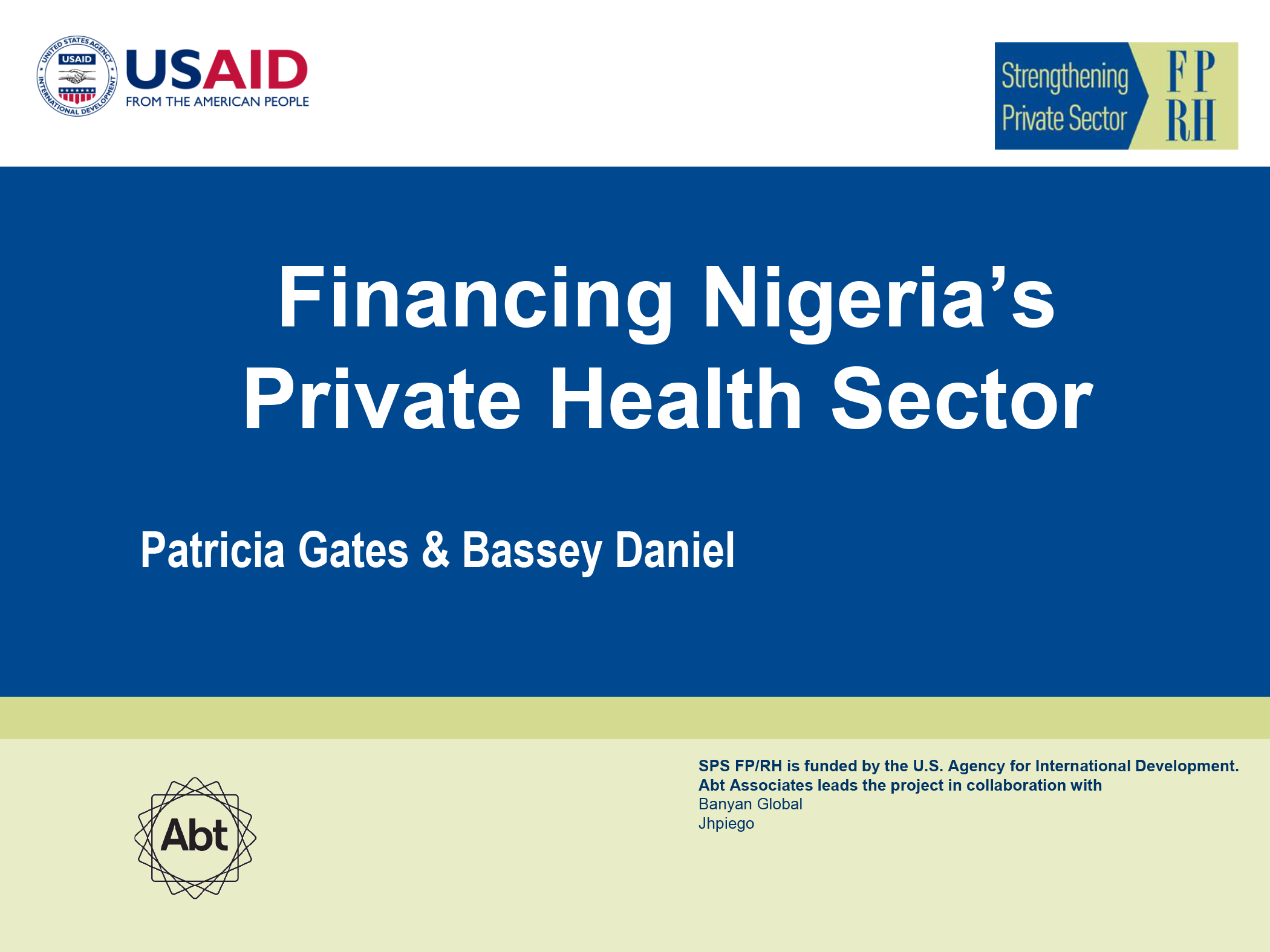
Resource Library
Renforcement des résultats de planification familiale au moyen du secteur privé
This fact sheet provides a brief overview of how the SHOPS project increases the role of the private sector in the provision of quality family planning products and services, with examples from Bangladesh, India, Jordan, and Nigeria.
Resource Type : Brief
Country : Bangladesh, India, Jordan, Nigeria
Year : 2013-11-25T00:00:00
Language : French
Project : SHOPS

Resource Library

Saving Lives and Fulfilling Destinies through Family Planning
In sub-Saharan Africa and Asia, close to 40 percent of women go to the private sector for their family planning needs. In this video, Ayodele Iroko, chief of party of SHOPS Nigeria and Susan Mitchell, director of SHOPS, discuss how the private sector plays a critical role in family planning. Ayodele and Susan highlight accomplishments from SHOPS project-led family planning activities implemented in Nigeria, Bangladesh, and Jordan.
Resource Type : Video
Country : Bangladesh, Jordan, Nigeria
Year : 2013-11-13T12:00:00
Language : English
Project : SHOPS

Resource Library
Video Transcript: Saving Lives and Fulfilling Destinies through Family Planning
This is a transcript of the video, "Saving Lives and Fulfilling Destinies through Family Planning."
Resource Type : Other
Country : Bangladesh, Jordan, Nigeria
Year : 2013-09-01T12:00:00
Language : English
Project : SHOPS

Resource Library
Use of Private Health Facility Census Data to Inform Programs
This presentation discusses lessons learned from conducting private health facility censuses in eight countries: Antigua and Barbuda, Benin, Dominica, Malawi, Namibia, Nigeria (six states), St. Kitts and Nevis, and St. Vincent and the Grenadines. These exercises were designed to take a census of the private health facilities in each of these countries, including key characteristics such as location and types of services provided. Data from private health facility censuses may be used for a wide variety of purposes. Key challenges in conducting private health facility censuses include locating facilities and collecting certain types of information (e.g., expenses and quality data). The presentation was made by Douglas Johnson at a Private Sector Working Group meeting in December 2013.
Resource Type : Presentation
Country : Benin, Malawi, Namibia, Nigeria
Year : 2013-10-18T00:00:00
Language : English
Project : SHOPS

Resource Library
Gaining Ground in the Private Sector
In this presentation, Ayodele Iroko examines the current role of the private sector in providing family planning services in Nigeria. Iroko discusses the SHOPS project's efforts to increase the provision of privately provided family planning services and suggests methods to facilitate scale-up of those services.
Resource Type : Presentation
Country : Nigeria
Year : 2013-07-08T00:00:00
Language : English
Project : SHOPS

Resource Library
Improving the Quality and Sustainability of Private Sector Family Planning and Maternal and Child Health Services in Nigeria
A four-page overview of the initiatives implemented by SHOPS to strengthen private clinic-based family planning and reproductive health services, and maternal and child health services in Nigeria.
Resource Type :
Country : Nigeria
Year : 2013-05-07T00:00:00
Language : English
Project : SHOPS

Resource Library
Strengthening Family Planning Outcomes through the Private Sector (2013)
This fact sheet provides a brief overview of how the SHOPS project increases the role of the private sector in the provision of quality family planning products and services, with examples from Bangladesh, India, Jordan, and Nigeria.
Resource Type :
Country : Bangladesh, India, Jordan, Nigeria
Year : 2013-11-25T00:00:00
Language : English
Project : SHOPS

Resource Library
Using Willingness to Pay Data to Inform the Design of Health Insurance: Evidence from Nigeria
While there is significant interest in expanding insurance coverage among the poor through micro-health insurance, there are important barriers, such as price, which may limit uptake. We investigate individuals’ interest in different health insurance packages and willingness to pay for these packages, to inform the design of health insurance products that better meet the needs of the urban poor in Lagos, Nigeria. This presentation was made at the PSWG Quarterly Meeting on February 6, 2013.
Resource Type : Presentation
Country : Nigeria
Year : 2013-02-05T00:00:00
Language : English
Project : SHOPS

Resource Library
Nigeria Private Health Sector Assessment (2012)
This brief is a summary of the Nigeria private health sector assessment conducted by the SHOPS project in 2010. Ananya Price prepared this brief which presents the assessment methods, findings, and the following key recommendations:
- Expand the supply of quality private sector health services in reproductive health/family planning
- Enhance demand for private sector RH/FP services
- Create an enabling policy environment for the private sector
- Ensure effective donor coordination for strengthening the private health sector
- Support a rigorous research agenda for the private health sector
To increase utilization of all modern family planning methods through the private sector, efforts need to be made by the government and its development partners to effectively link active and targeted demand-creation efforts to supply side strategies, to create an effective policy environment, and to pursue a rigorous research agenda for this sector to reach its maximum potential.
Resource Type : Brief
Country : Nigeria
Year : 2012-08-22T00:00:00
Language : English
Project : SHOPS

Resource Library
Financing Nigeria's Private Health Sector
This presentation discusses the approach to access to finance taken by the Strengthening Private Sector Family Planning & Reproductive Health (SPSFP/RH), an Associate Award under the SHOPS project. SPSFP/RH provides by business and clinical support through business training, business counseling and access to loan opportunities, as well as clinical skills training, monitoring, and provision of family planning seed stock. The project has also worked with the Office of Development Credit at USAID to create a Development Credit Authority that guarantees a percentage of the loans offered to the providers who participate in the program. The presentation describes the number of loans offered and the challenges associated with this model.
Resource Type : Presentation
Country : Nigeria
Year : 2012-06-25T00:00:00
Language : English
Project : SHOPS
Pagination
- Previous page
- Page 10
- Next page


